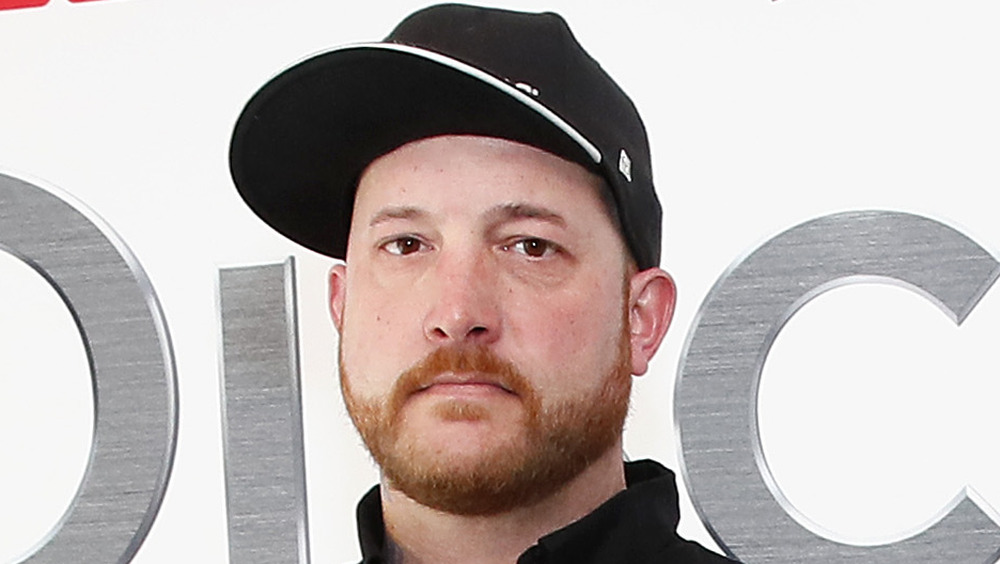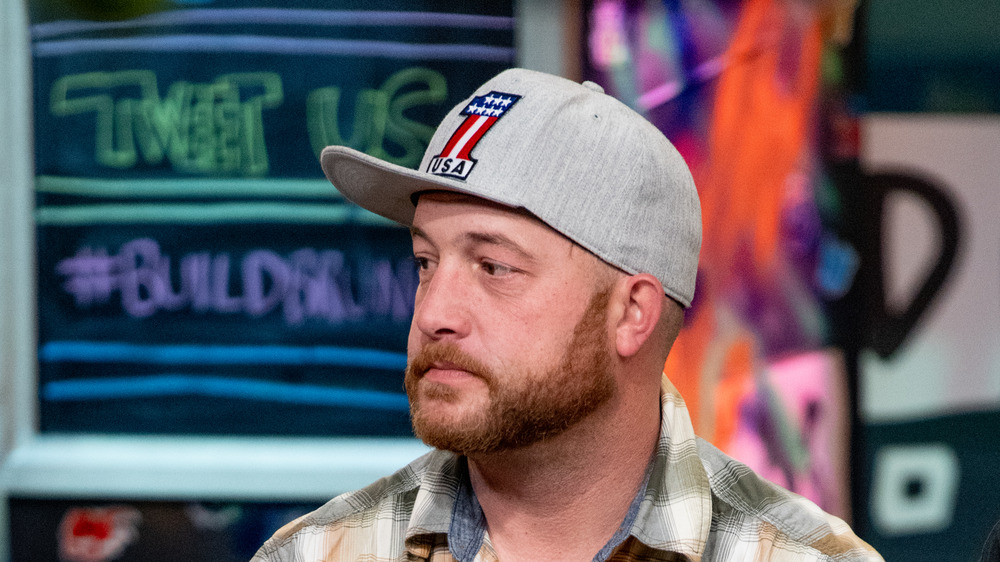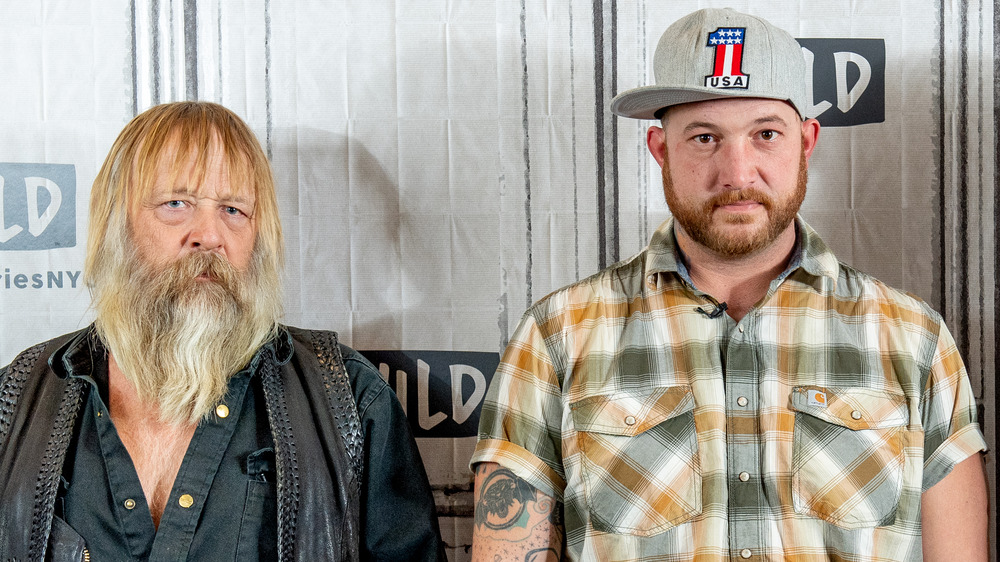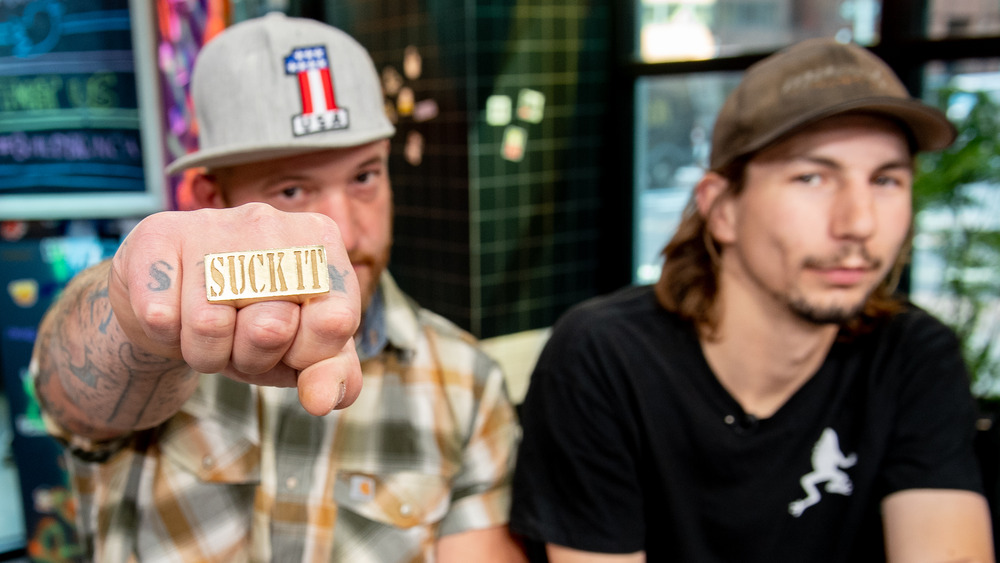Mine Boss Rick Ness Gives Us The Goods On Gold Rush - Exclusive Interview
From the second he signed on with series regular Parker Schnabel to mine for gold in the Klondike region of the Canadian Yukon during season two of the Discovery Channel hit Gold Rush, Rick Ness was a fan favorite and the people's champ. The brawny, tattooed everyman with Midwestern roots appealed to the "can do" spirit alive in everyone, and fans were on board when Rick split from Parker at the end of season 8 in order to develop and run an independent gold mining operation.
With his feet wet in the industry, a knack for solving problems with big machinery, and a hand-picked crew of close pals from back home in Milwaukee, the Rick Ness team beat their 1,000-ounce goal and cleared $1.3 million in gold. Since his first season as a mine boss, the full brunt of placer mining's perpetual challenges, dangers, and setbacks have hit Rick and his crew hard. But true to his hardworking spirit, he hasn't let the gold rush bum rush his enthusiasm. In this Looper exclusive, Rick dished on his truly epic season 11 gold haul, what it's really like to be a mine boss on Gold Rush, and teased what's in store for him, his crew, and the race for rocks in Gold Rush season 12.
An epic gold haul and what it takes to do it again
So you did pretty well last season, season 11, right? You guys cleared $2 million in gold last season, and that was despite starting late because of COVID. So is it safe to say that this was your most challenging and yet most rewarding year, up there in the Yukon?
Whoops. I really hope I have another one like that again.
You can say that again.
Yeah, the challenging part, I guess. But the most rewarding part, I guess I'll take that again, though.
Despite everything, it worked out.
Yeah, it was something like, it was one of those that you'd never even considered that could happen, you know what I mean? A global pandemic, first of all, and then in a season that short. The fact that anything can make you, you know, basically cut off a fifth of our season, like, that's your damn near quarter? I mean, would you ever prepare for that again? It's just unreal.
Yeah, and I'm sure it's very realistic that the weather will come in literally any day, like that's not for TV's sake, that's literally a thing where it's around the corner and you don't know when that corner is hitting.
Yeah, that's the thing, right? It's not like we've got some TV schedule that we run on, right? Like, "Oh well, filming is gonna end on this date, so we got about..." A lot, though, it's filming on the same day as the damn weather stuff, and the snow hits, and the ice, and it is what it is. So yeah, it's a unique thing for TV, for sure.
What would you say you've learned about yourself over this journey as a mine boss since season nine? Now you've had all of these experiences.
Well, I'd have to say a lot because I mean, there's been, it has been a roller coaster. I mean it's been, up, down, left, right, sideways, and the only reason I'm still here is because, you know, I've made a lot of mistakes, and I've learned from them. And that's the only way you can keep going, is you make mistakes — they can kill you, but if you learn from them, you know, it doesn't necessarily have to be a bad thing. If you learn from it, you can move forward. You know you can.
You figure out a way to pivot. You're constantly pivoting.
Yeah, there's a constant game of that. I mean, you can come up with the best plan you want, right? I've got a great plan going for this year, but the fact of the matter is that it is not going to work out the way you plan it in any way, shape or form, and if you're not ready to pivot and go the way that it's, you know, you need to go when it has to happen, then you're done for.
Murphy's Law, hunches, and Tony Beets
Speaking of that, one of the most compelling things about the show over its many seasons is watching that pivot in real time, because something is always breaking down, going sideways. Murphy's Law is alive and well up there. How do you keep dealing with the "If it's not one thing, it's another" factor?
You have to keep dealing with it because if you don't, you're stuck, and that's what almost happened to me in my second season, running my own business areas, I got hit with a lot of things coming, and, you know, the fact of the matter is, that was no different than anything, any other year up there, it's just for some reason I lost. I lost my confidence that year, I lost my ability to trust in my decisions, to pivot like that when things happen, and that was nearly the end for me. That was a big thing for me to get over as I reflected after that season, to know what the hell happened, and when I realized that, what had happened, for some reason I wasn't trusting my gut and my ability to do what needed to be done. You know, I came back the next year and really focused on that, and I think that the results of that show.
I think so too. Leading from that, I think one thing that's really cool about the show and your work on the show is sort of the power and the allure of the "hunch," you know? Like a hunch as a thing. Like, for example, your hunch about the creek bed holding payload was right, this past season, but what if it hadn't been? That's a big what if, and yet the hunch still has that power.
Yeah well, it's a dangerous thing because yes, you just said it perfectly there. You know, what if it hadn't. You know there'll always be a bit of that there with me because that's gold mining, but I am working towards kind of minimizing that whole "hunch" thing, testing it, trying to rely more on, you know, a specific set of reasons that help me know where I'm going is correct. But I don't think I'll ever get rid of that whole, you know, "Maybe this, maybe that." But if the stakes are less in the future doing that, I think it'll turn out to be an even better part of how I go about things.
Do you think that plays into where you're going to mine next? Like you're in the helicopter last season, looking at doing a sort of scientific survey.
It's a tough thing — that was a very specifically scientific way to go about things, but I am learning how to read the ground. You know, I will go in there this spring, although I do have a hunch as to where I want to go, what I am going to do. I am going to do some drilling and stuff right away in the spring to make sure that what I saw last fall, which seems like a century ago already, is correct.
What's the status of Tony Beets's offer to you with the Indian River land, to mine that?
Well, to be honest with you, I was really appreciative of Tony. I mean, that's not something he does often.
That came through in the show.
Yeah, and you know, I respect Tony a lot and it's a good offer, and I never shut down completely a good offer like that, so I mean it's, it's still on the table. It's still one of the things that I'm considering. If Tony Beets has offered me some ground with good gold in it, and if I get the gold out of the ground. You never know.
Gold Rush season 12, Rick's team, and his relationship with Parker
That speaks to a larger question about the Klondike and the Yukon. There's a finite amount of land that has gold in it, but that land is getting more scarce over time in that region. And I wonder if that would lead you or the production of the show to move operations to another region entirely.
Yeah, well, I mean... that's the thing, right? Like, they're not making any more ground with gold in it, you're right about that. There is still, I would say, a lot of ground left in the Klondike with gold in it, but the fact of the matter is that it's getting harder and harder to get back to that ground. You know, you can fly a helicopter out to the middle of nowhere where no one's ever been and there could be an amazing amount of gold there, but if you don't have the money to put the infrastructure into getting in, that really ain't worth anything. So I'll never say I can never predict where I'm going to end up, but I guess I'm always gonna go where the best opportunity is.
We can assume that season 12 is a thing? I mean, I'm sure it is, right? I don't think they've announced that officially.
It is a thing. Yeah.
Do you think you'll have the same team up there with you?
Pretty much. I've got the same team coming in, I've got some additions. I've got some new people coming in, not a lot. I'm not trying to go crazy, I had a good season, but I don't want to expand too big. I don't want to always expand. But you know, a reasonable amount. So yeah, I got the same few guys and I got a couple of really good new additions to it.
It sounds like, as it keeps going, it's becoming your life's work. And it's kind of funny how you ended up doing it, but you're doing the hell out of it.
It is. It is crazy to think about, going on a decade now. That's a quarter of my life. And that's something that until I until the day I started doing it, I never would have even considered it.
Where you are now, does that put into context your relationship with Parker, going all the way back — like that if you'd never met him, who knows what would have gone on with your life?
Oh absolutely, I mean, when I met him it was, it was kind of a pivotal spot in my life where I was just coming off of a decade of playing music. My life was traveling the world, you know, playing music eight months a year, and I was dead set on being done with that — I didn't know if it was going to be permanently, but definitely a long break. And I really had no idea what I was going to do. I didn't know. And you know when I met Parker at those shows, we were basically decided that we were done, and we had to finish off our commitments, we had like eight or nine months worth of shows, but yeah... maybe I would have ended up in Alaska, because I was that set again to Alaska to do something for a summer. Maybe I would have been doing something completely different in Alaska that would have only lasted one season.
You might have been "Rick Ness, bush pilot to the stars."
Yeah, who knows. Or on a fishing boat or something.



